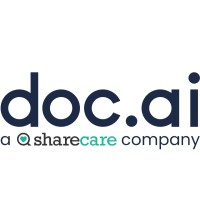Or listen in your favorite podcast app
Apple Podcasts / Google Podcasts / Spotify
The best products and solutions are often born out of personal experiences. For Sam De Brouwer, CEO and Co-Founder of doc.ai, her breakthrough moment occurred after her son was hospitalized and induced into a coma as a result of a severe accident. Frustrated, anxious, and wanting to help, Sam found herself doing what any mother would; looking for ways she could make a difference.
“What I was seeing at the hospital, and what I was trying to do for my son, I saw other parents trying to do the same thing. Trying to understand the machines, trying to understand those numbers, trying to understand the language, trying to access the information so that you could ask for second opinions, because the situation was too serious to not ask for a second or third opinion.”
With a background at the intersection of technology, research, and healthcare, Sam and her husband launched doc.ai in 2016 in an effort to accelerate digital transformation in the healthcare space. On this episode of IT Visionaries, Sam details some of the issues within the healthcare space when it comes to utilizing data to produce actionable learning models, how neural nets are impacting data collection and the future of edge A.I. in healthcare.
Main Takeaways
- There Has to Be a Better Way: The biggest issue with how data is recorded and distributed within the healthcare industry is that all data is siloed and fragmented, meaning that instead of data being easily available to help with learning models and predictive science, the opposite is true, making digital tasks difficult for third party companies.
- Neural Nets for the Win: By utilizing neural nets, data collection has become as easy as taking a picture. Neural nets are a machine learning technique that gathers data and insights based on previous training data. Doc.ai uses these techniques to record information such as height, weight, and age and then uploads that information to the cloud in an effort to make that data accessible in real-time.
- iDoctor: The future of the healthcare industry hinges on technologies such as A.I. and federated learning. Doctors and healthcare professionals should be embracing automation techniques in order to not get bogged down by rudimentary tasks that take time away from them and their patients.
—–
For a more in-depth look at this episode, check out the article below.
The best products and solutions are often born out of personal experiences. For Sam De Brouwer, CEO and Co-Founder of doc.ai, her breakthrough moment occurred after her son was hospitalized and induced into a coma as a result of a car accident. Frustrated, anxious, and wanting to help, Sam found herself doing what any mother would; looking for ways she could make a difference.
“What I was seeing at the hospital, and what I was trying to do for my son, I saw other parents trying to do the same thing. Trying to understand the machines, trying to understand those numbers, trying to understand the language, trying to access the information so that you could ask for second opinions, because the situation was too serious to not ask for a second or third opinion.”
With a background at the intersection of technology, research, and healthcare, Sam and her husband launched doc.ai in 2016 in an effort to accelerate digital transformation in the healthcare space. On this episode of IT Visionaries, Sam details some of the issues within the healthcare space when it comes to utilizing data to produce actionable learning models, how neural nets are impacting data collection and the future of edge A.I. in healthcare.
“What we are doing is trying to solve the problems of making healthcare more data-driven so that the data of today can help you change to the data of tomorrow and make better decisions,” De Brouwer said.
According to De Brouwer, one of the frustrations she had with healthcare was how the industry captures and stores its data, citing that the process is incredibly siloed and fractured, making it difficult to actually leverage medical records. This frustration was compounded knowing that other options are readily available to better paint the full picture of our health
“We all have smartphones, we collect a ton of data.” She said. “We have trackers, we have wearables, we upload all kinds of tests. So that data, on top of the new type of sequencing, represents a multi-dimension to your health that we have not been able to capture.”
In an effort to rectify some of those pain points and to capture those missed opportunities, doc.ai set out to build products and solutions that enable the user to capture and share data in real-time and to help accelerate the way research is conducted in the healthcare space. By utilizing an A.I.-driven platform, doc.ai is able to collect data and contribute to learning models in order to predict future healthcare uses.
“We have built our product and solutions to make it possible for anyone who has a smartphone to participate in the new algorithms of our health,” she said. “Everything happens on people’s phones and on people’s sensors. As a company, we are mobile-first and so we are leveraged on every single component of the mobile phones.”
One of the ways doc.ai is leveraging the use of mobile devices to capture insights is through neural nets. Neural nets are a means of machine learning in which a computer learns to perform a task by analyzing training examples. In the case of how doc.ai uses neural nets, patients are empowered with the right to participate in studies with transparency around what exactly is happening with their data. All they have to do to participate is simply use the camera on their phone.
“Once your phenotyping formation, which is your height, weight, age and so on, [our system can collect] all that information with just a picture, it’s a smart selfie.” De Brouwer said. “Instead of collecting four or five data points and trying to find where it is, you just take that picture and it’s on your phone. We have the same technology for medication. You just take a picture of your pill box and it’s in your phone, not only the name, but the dosage, the frequency, it basically understands what is on the label. It’s natural language processing.”
According to De Brouwer the future of how and when health care advances take place will hinge on embracing new technologies, especially when it comes to A.I., A.I at the edge, and federated learning.
“There’s still a lot of work to do because we simply need to clinically validate those algorithms that could potentially be used for diagnostic purposes,” she said. “There’s a lot of work happening, but you need clinical validation. What is very interesting is the pandemic has accelerated everything…So we are not going back. The bar has risen. We are getting there a bit faster because of that acceleration, and also because of other types of technology that are being deployed as we speak, such as federated learning, which is an A.I. technique where instead of sharing the data coming from the phones or from the cloud, you share the learnings and you can share them with other phones or with other clouds.
To learn more about doc.ai and other advancements within the healthcare industry, check out the full episode of IT Visionaries.
—
To hear the entire discussion, tune into IT Visionaries here.





